新编英语教程5课文翻译(unit4)
高级英语 新编英语教程5 课文+翻译 unit9
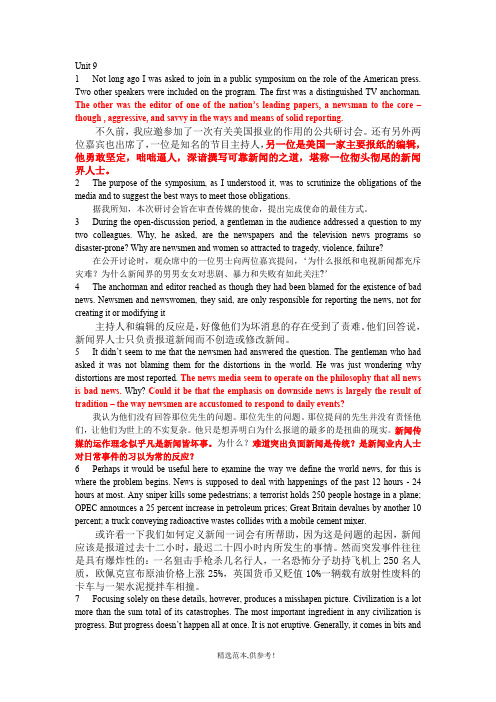
Unit 91 Not long ago I was asked to join in a public symposium on the role of the American press. Two other speakers were included on the program. The first was a distinguished TV anchorman. The other was the editor of one of the nation’s leading papers, a newsman to the core –though , aggressive, and savvy in the ways and means of solid reporting.不久前,我应邀参加了一次有关美国报业的作用的公共研讨会。
还有另外两位嘉宾也出席了,一位是知名的节目主持人,另一位是美国一家主要报纸的编辑,他勇敢坚定,咄咄逼人,深谙撰写可靠新闻的之道,堪称一位彻头彻尾的新闻界人士。
2 The purpose of the symposium, as I understood it, was to scrutinize the obligations of the media and to suggest the best ways to meet those obligations.据我所知,本次研讨会旨在审查传媒的使命,提出完成使命的最佳方式。
3 During the open-discussion period, a gentleman in the audience addressed a question to my two colleagues. Why, he asked, are the newspapers and the television news programs so disaster-prone? Why are newsmen and women so attracted to tragedy, violence, failure?在公开讨论时,观众席中的一位男士向两位嘉宾提问,‘为什么报纸和电视新闻都充斥灾难?为什么新闻界的男男女女对悲剧、暴力和失败有如此关注?’4 The anchorman and editor reached as though they had been blamed for the existence of bad news. Newsmen and newswomen, they said, are only responsible for reporting the news, not for creating it or modifying it主持人和编辑的反应是,好像他们为坏消息的存在受到了责难。
高级英语 新编英语教程5 课文+翻译 unit5
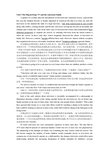
Unit 5 The Plug-in Drug: TV and the American FamilyA quarter of a century after the introduction of television into American society, a period that has seen the medium become so deeply ingrained in American life that in at least one state the television set has attained the rank of a legal necessity, 1safe from repossession in case of debt along with clothes, cooking utensils, and the like, television viewing has become an inevitable and ordinary part of daily life. Only in the early years of television did writers and commentators2have sufficient perspective to separate the activity of watching television from the actual content it offers the viewer. In those early days writers frequently discussed the effects of television on family life. However a curious 3myopia afflicted those early observers: almost without exception they regarded television as a favorable, beneficial, indeed, 4wondrous influence upon the family.在电视机这项发明进入美国人生活的25后,他已经在美国人的生活中根深蒂固,甚至美国至少有一个州的法律规定电视机是生活的必须品,而且如果负债,它可以和衣物,厨具一样免于作为财产抵押,而且看电视也成为人们生活中非常普遍甚至是不可避免的活动。
全新版大学英语综合教程5 unit1 课后答案

1.(1) allot
(2) go through fire and water
(3) reside
(4) sobbed
(5) made no mention of
(6) sacrifice
(7) came upon
(8) rhythm
2. She had thought that books were natural wonders, coming up of themselves like grass. So it was "startling and disappointing" for her to find out that story books had been, contrary to her expectations, written by people.
(8) Answer: an old Ford
P24 cloze
(1) Answer: go through fire and water
(2) Answer: salary
(3) Answer: give
(4) Answer: no peace
(5) Answer: sink into
(7) inward
5. (1) Answer: have come upon / across
(2) Answer: had come out
(3) Answer: come on / up
(4) Answer: came across
(5) Answer: comes down to
7. The book was completely worn out - it was lacking its front cover, the back held on by strips of pasted paper, and the pages stained; its illustrations had come unattached. Welty's father had lost his mother when he was seven, and this book was the only book he as a little boy had had of his own. Although he had never made any mention to his own children of the book, he had brought it along with him from Ohio to their house and shelved it in their bookcase.
新视野大学英语(第三版)读写教程4课文翻译

Unit1 爱情与逻辑:谬误的故事1 在我和室友罗伯的交易成功之后,我和波莉有了第一次约会。
那一年校园里每个人都有件皮夹克,而罗伯是校足球队员中唯一一个没有皮夹克的,他一想到这个就受不了,于是他和我达成了一项协议,用他的女友换取我的夹克。
他可不那么聪明,而他的女友波莉也不太精明。
2 但她漂亮而且富有,也没有把头发染成奇怪的颜色或是化很浓的妆。
她拥有合适的家庭背景,足以胜任一名坚忍而睿智的律师的女友。
如果我能够让我所申请的顶尖律师事务所看到我身边伴随着一位光彩照人、谈吐优雅的另一半,我就很有可能在竞聘中以微弱优势获胜。
3 “光彩照人”,她已经是了。
而我也能施予她足够多的“智慧之珠”,让她变得“谈吐优雅”。
4 在一起外出度过了美好的一天之后,我驱车来到了高速公路旁一座小山上一棵古老的大橡树下。
我的想法有些怪异。
而这个地方能够俯瞰灯火灿烂的城区,我觉得它会使人的心情变轻松。
我们呆在车子里,我调低了音响并把脚从刹车上挪开。
“我们要谈些什么?”她问道。
5 “逻辑学。
”6 “好酷啊,”她一边嚼着口香糖一边说。
7 “逻辑学的原理,”我说道,“即清晰思考的主要原则。
逻辑上出现的问题会歪曲事实,其中有些还很普遍。
我们先来看看一种叫做‘绝对判断’的逻辑谬误。
”8 “好啊,”她表示同意。
9 “‘绝对判断’是指在证据不足的情况下所作出的推断。
比方说:运动是有益的,所以每个人都应该运动。
”10 她点头表示赞同。
11 我看得出她没弄明白。
“波莉,”我解释说,“这个推断太过简单化了。
如果你有心脏病或者超级肥胖症什么的,运动就变得有害而不是有益。
所以你应该说,运动对大多数人来说是有益的。
”12 “接下来是‘草率结论’。
这似乎不言自明,对吧?仔细听好了:你不会说法语,罗伯也不会说法语,那么这所学校里好像是没有人会说法语。
”13 “是吗?”波莉吃惊地说。
“没有人吗?”14 “这也是一种逻辑谬误,”我说,“这一结论太草率了,因为能够支持这一结论的例证太少了。
[新编英语教程课文翻译]新编大学英语4课文翻译
![[新编英语教程课文翻译]新编大学英语4课文翻译](https://img.taocdn.com/s3/m/de5a24f59f3143323968011ca300a6c30c22f17f.png)
[新编英语教程课文翻译]新编大学英语4课文翻译(1) [新编大学英语4课文翻译]新概念3课文新概念3课文基本结论:看熟、听熟、读熟、译熟《新概念英语》四册教科书的课文,必能背熟其课文。
能如此背熟四册课文,听、说、读、写和译英语的的五项技能和考试能力都会很好的,面对目前国内外的英语考试都能过关。
再参加些活动,拿高分也不奇怪。
一. 四熟:看熟、听熟、读熟、译熟__背熟二. 看熟:1。
快速读课文,抓信息点(关键词组合),理出信息链(关键词组合及表达组合);并把信息点、信息链标出或记录下来;2。
查生词,查感觉不好的词和词组;3。
查语法,对句子逐句逐句地进行语法结构分析,找出好表达和句子;4。
搞明白课文意思,最好翻译出中文;5。
同义词、反义词、近义词、相似词和关联词,整合起来想一想。
三. 听熟:1。
逐字逐句地听,听惯那些轻读、重读、连读等;进行英语信息点思考,边听边用英语关键词及表达思考;2。
逐段逐段地听,注意意群等;进行英语信息点思考,边听边用英语关键词组合及表达组合思考;3。
整篇听;进行英语信息点思考,边听边用英语关键词组合及表达组合思考;四. 读熟:1。
对照课文语音,反复朗读信息点的英语,读准读熟;2。
对照课文语音,反复朗读信息链的英语,读准读熟;3。
逐句逐句地朗读,读准读熟;逐段逐段地朗读,读准读熟;4。
朗读习惯了,以培养出英语语感来。
五. 译熟:1。
对照课本所提供的课文中文译文,逐句逐句地进行中英文互译,译熟为准;并比较中英文表达特点;2。
对照课本所提供的课文中文译文,逐段逐段地进行中英文互译,译熟为准;并比较中英文表达特点。
3。
总结中英文表达特点,总结翻译技巧。
六。
五项技能之基础:如此,听、说、读、写和译的五项技能训练,必能打下坚实的基础。
第一、二、三册的训练,解决了听、说的问题;第三、四册的训练,提高了听、说的问题,解决了阅读、写作和翻译的问题。
七。
五项能力提高:1。
多读英文刊物,扩大词汇量,扩大话题表达句型量,提高阅读和写作水平;2。
李观仪《新编英语教程(5)》(第3版)学习指南【词汇短语+课文精解+全文翻译+练习答案】

李观仪《新编英语教程(5)》(第3版)学习指南【词汇短语+课文精解+全文翻译+练习答案】目录Unit 1 一、词汇短语 二、参考译文 三、课文注释 四、练习答案Unit 2 一、词汇短语 二、参考译文 三、课文注释 四、练习答案Unit 3 一、词汇短语 二、参考译文 三、课文注释 四、练习答案Unit 4 一、词汇短语 二、参考译文 三、课文注释 四、练习答案Unit 5 一、词汇短语 二、参考译文 三、课文注释 四、练习答案Unit 6 一、词汇短语 二、参考译文 三、课文注释 四、练习答案Unit 7 一、词汇短语 二、参考译文 三、课文注释 四、练习答案Unit 8 一、词汇短语 二、参考译文 三、课文注释 四、练习答案Unit 9 一、词汇短语 二、参考译文 三、课文注释 四、练习答案Unit 10 一、词汇短语 二、参考译文 三、课文注释 四、练习答案Unit 11 一、词汇短语 二、参考译文 三、课文注释 四、练习答案Unit 12 一、词汇短语 二、参考译文 三、课文注释 四、练习答案弘博学习网————各类考试资料全收录内容简介《新编英语教程(第3版)学习指南》按照原教材的课次进行编写,每单元涉及单元语法、词汇短语、参考译文、课文精解以及练习答案等内容,旨在帮助学生更好、更高效地学习和掌握教材中的重点及难点知识,具有很强的针对性和实用性。
在编写过程中,该书力求突出重点,答疑难点,语言言简意赅,讲解深入浅出,希望它能得到广大英语专业学生和英语自学者的喜爱和认可。
弘博学习网————各类考试资料全收录Unit 1一、词汇短语Text I1clumsy [5klQmzi] adj. moving or doing things in a very awkward way 笨拙的,拙劣的:I spilt your coffee. Sorry—that was clumsy of me.我把你的咖啡弄洒了。
新编英语教程5(第三版李观仪)Unit1-8课文及译文参考

Unit 1 恰到好处Have you ever watched a clumsy man hammering a nail into a box?He hits it first to one side,then to another, perhaps knocking it over completely,so that in the end he only gets half of it into the wood。
A skillful carpenter, on the other hand,will drive the nail with a few firm, deft blows, hitting it each time squarely on the head. So with language;the good craftsman will choose words that drive home his point firmly and exactly。
A word that is more or less right, a loose phrase,an ambiguous expression,a vague adjective(模糊的形容词),will not satisfy a writer who aims at clean English. He will try always to get the word that is completely right for his purpose.你见过一个笨手笨脚的男人往箱子上钉钉子吗?只见他左敲敲,右敲敲,说不准还会将整个钉子锤翻,结果敲来敲去到头来只敲进了半截.而娴熟的木匠就不这么干。
他每敲一下都会坚实巧妙地正对着钉头落下去,一钉到底.语言也是如此。
一位优秀的艺术家谴词造句上力求准确而有力地表达自己的观点。
差不多的词,不准确的短语,摸棱两可的表达,含糊不清的修饰,都无法使一位追求纯真英语的作家满意.他会一直思考,直至找到那个能准确表达他的意思的词.The French have an apt(贴切的) phrase for this。
(完整word版)新编英语教程5(1-12)课文翻译.docx
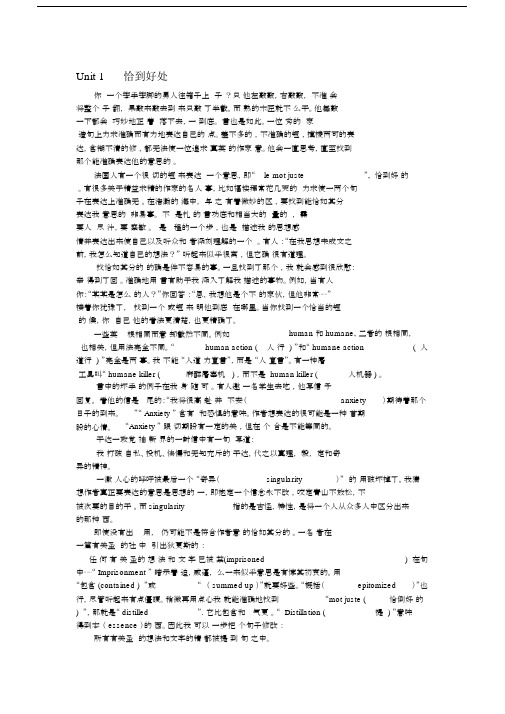
Unit 1恰到好处你一个笨手笨脚的男人往箱子上子?只他左敲敲,右敲敲,不准会将整个子翻,果敲来敲去到来只敲了半截。
而熟的木匠就不么干。
他每敲一下都会巧妙地正着落下去,一到底。
言也是如此。
一位秀的家造句上力求准确而有力地表达自己的点。
差不多的,不准确的短,摸棱两可的表达,含糊不清的修,都无法使一位追求真英的作家意。
他会一直思考,直至找到那个能准确表达他的意思的。
法国人有一个很切的短来表达一个意思,即“ le mot juste”, 恰到好的。
有很多关于精益求精的作家的名人事,比如福楼拜常花几天的力求使一两个句子在表达上准确无。
在浩瀚的海中,与之有着微妙的区,要找到能恰如其分表达我意思的非易事。
不是扎的言功底和相当大的量的,需要人尽汁,要察敏。
是程的一个步,也是描述我的思想感情并表达出来使自己以及听众和者深刻理解的一个。
有人:“在我思想未成文之前,我怎么知道自己的想法?” 听起来似乎很离,但它确很有道理。
找恰如其分的的确是件不容易的事。
一旦找到了那个,我就会感到很欣慰:辛得到了回。
准确地用言有助于我深入了解我描述的事物。
例如,当有人你:“某某是怎么的人?”你回答:“恩,我想他是个不的家伙,但他非常⋯⋯”接着你犹豫了,找到一个或短来明他到底在哪里。
当你找到一个恰当的短的候,你自己他的看法更清楚,也更精确了。
一些英根相同而意却截然不同。
例如human 和 humane, 二者的根相同,也相关,但用法完全不同。
“human action (人行 ) ”和“ humane action( 人道行 ) ”完全是两事。
我不能“人道力宣言”,而是“人宣言”。
有一种屠工具叫“ humane killer (麻醉屠宰机 ) ,而不是 human killer (人机器 ) 。
言中的坏手的例子在我身随可。
有人邀一名学生去吃,他写信予回复。
看他的信是尾的:“我将很高赴并不安(anxiety)期待着那个日子的到来。
”“ Anxiety ”含有和恐惧的意味。
新编英语教程5(词汇Unit1-10)
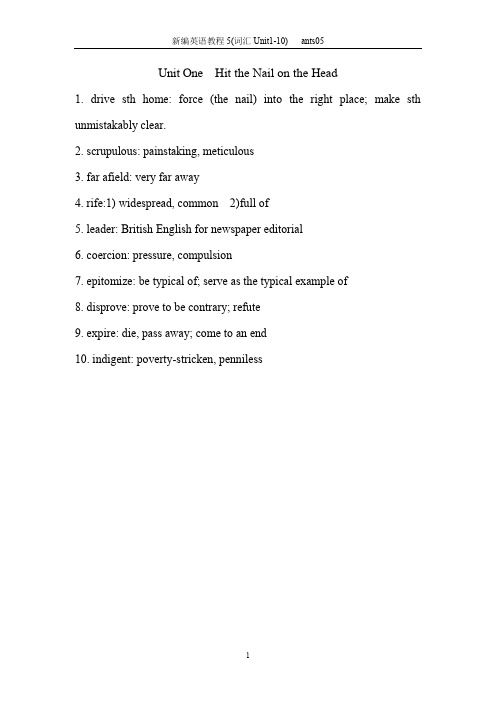
Unit One Hit the Nail on the Head1. drive sth home: force (the nail) into the right place; make sth unmistakably clear.2. scrupulous: painstaking, meticulous3. far afield: very far away4. rife:1) widespread, common 2)full of5. leader: British English for newspaper editorial6. coercion: pressure, compulsion7. epitomize: be typical of; serve as the typical example of8. disprove: prove to be contrary; refute9. expire: die, pass away; come to an end10. indigent: poverty-stricken, pennilessUnit Two Beware the dirty seas1. sluice: (v.) to pour as if from a sluice(水闸),i.e., a man-made passage for water fitted with a gate for stopping and regulating the flow; (n.) a channel controlling water flow2. nurture: further the development of; care for3. evolve: develop gradually (by a long continuous process)4. endemic: (of a disease) found regularly in a particular place5. litany: repetition. The literal meaning of “litany” is “a prayer consisting of a series of invocations and supplications by the leader with responses by the congregation”.6. flush: pour; flood with water to clean out (See dictionary)7. lurk: exist unseen8. effluent: liquid wastes, such as chemicals or sewage that flows out from a factory or some other places into a river or the sea9. plankton: very small forms of plant and animal life that live in a body off water 浮游生物10. slime: unpleasant sticky substance, such as the thick sticky liquid on the skin of various fishUnit Three My Friend, Albert Einstein1. knack: a clever way of doing things2. be in awe of: have respect as well as fear and reverence for3. staggering: unexpectedly surprising; astounding4. vestiges: traces5. ultimately: finally; after a long series of time6. recalcitrant: hard to deal with; unmanageable7. worry: assail a problem again and again until it is solved, just like a dog biting some small animals repeatedly, shaking it or pulling it with the teeth8. surcease: (archaic) cessation, pause9. plausible: seeming to be reasonable10. a house of cards: an insecure scheme11. ineffable: unutterable; incapable of being expressed in words12. elusively whimsical: indescribably quaint or strange 捉摸不透的,古怪Unit Four The Invisible Poor1. perennial: lasting forever or for a long time2. rutted roads: roads with deep, narrow marks made by the wheels of vehicles3. be exempt from: be freed from a duty. service, payment, etc.4. tenement: a large building, especially one in the poor part of a city, which is divided into small flats which are rented cheaply5. affluent: wealthy, prosperous6. compound v.: /kom'paund/ make worse by adding (something) to . . . (often used in the passive)7. existential: relating to human experience (a formal-word)8. lurid: sensational, shocking9. dispossessed: people who have lost all their possessions10. cynical: doubtful as to whether something will happen or whether it is worthwhile11. involvement: connection12. old rhetoric of reform: writings about reform in the past that sounded fine and important, but were really insincere and meaninglessUnit Five The Plug—in Drug:TV and the American Family,PartⅠ1. afflict: trouble2. asset: valuable object; advantage3. preposterous: unthinkable, absurd4. splintering: splitting, breaking up5. the peer group: a group of people of the same age, class, position. etc. here, group of children of the same age6. television-oriented: interested in and influenced by TV7. equivocal: ambiguous8. sorcerer: person who performs magic by using the power of evil spirits9. stint: fixed amount of work: here, the fixed TV programme10. conjure up: bring into the mind11. sane: (in this context) in possession of good relations/of a close bond12. backlog: a reserveUnit Six Preparing for College1. driving motive: the incentive / encouragement that urges them on;2. the rudiments: the basics, the fundamentals (The word rudiments is always in the plural form when used in this sense.)3. metaphysics: the branch of philosophy that deals with abstract concepts, etc. 形而上学,玄学,纯粹哲学4. conscious culture: the culture (i.e. customs, arts, etc,) that is directly perceptible or known to us5. fanatic: one who is very enthusiastic about a particular activity6. personify: express or represent ( a quality in human form)7. sedentary: inactive; done while sitting down8. underline: indicate the importance of9. balked: baffled; frustrated10. a maddening lot: a wild, uncontrollable group11. righteous sects: morally justifiable groups of people whose religious beliefs are considered different form those of a larger group12. relish: 味,味道,兴趣;开胃小菜;great enjoymentUnit Seven Grouping the Gifted:Pro1. innate: belonging to an individual from birth2. pursuit: an activity that one engages in as a profession, vocation, or avocation3. athlete: person who practises athletics; competitor or skilled performer in physical exercises4. heterogeneously: in such a way that members are very different from one another5. criterion /--ia: standard on which a decision may be based6. snob: one who has an offensive air of superiority (here, in matters of knowledge)7. elite: a socially superior group8. instill: put (ideas, etc. ) gradually but firmly into someone's mind by continuous effort9. spark: encourage; stimulate into greater activity10. latent: present and capable of becoming though not now visible or active11. skyrocket: rise or increase rapidly12. pay dividends: produce an advantage. especially as a result of an earlier action (dividend: that part of the money made by a business which is divided among those who own shares in the business 红利)Unit Eight Why Nothing Works1. savant: a man of learning, especially a person with detailed knowledge in some specialized field2. corollary: an immediate inference from a proved proposition3. forestall: defeat, prevent by prior measures4. commitment: a pledge to follow certain beliefs or a certain course of action; devotion (to duty etc. )5. artifact: a usually small object (as a tool or an ornament) showing human workmanship that has special historical interest6. evoke: bring to mind7. projectile point: the tip of a weapon that is thrust forward; spear or arrowhead8. band: a group of people formed for some common purpose and often with a leader9. barter: trade by exchanging one commodity for another10. alienation: a withdrawing or separation of a person from an object or position of former attachment; a feeling of not belonging to or being part of one's surroundingsUnit Nine Where Is the News Leading Us?1. symposium: a conference in which experts or scholars discuss a certain subject2. scrutinize: examine very closely and carefully3. distortion: misrepresentation; a false or dishonest account4. eruptive: (in this context) sensational, shocking, disturbing5. collide with: crash violently into; run into (one another)6. ingredient: a component part of something7. inhibitor: one who holds back, prevents8. deplete: exhaust, use up, reduce9. cynicism: disbelief in the sincerity of human motives10. antidote: remedy, corrective; something that prevents or counteracts11. envision: picture mentally, imagine, visualize12. caricature: a picture ludicrously滑稽的exaggerating the peculiarities or defects of persons or thingsUnit Ten Things:The Throw—Away Society1. Humanoid: having human form or characteristics2. texture: the degree of roughness or smoothness, coarseness or fineness, of a substance or material, especially as felt by touch; visual and tactile qualities of a surface3. staggering: stunning, wondrous, breathtaking4. deride: laugh at contemptuously; to scoff at or mock5. transience: temporariness, impermanence; the quality or state of being temporary or impermanent6. at a rapid clip: (informal) at a fast pace7. inextricably embedded: so deeply involved that it is impossible to get free8. boutique: a small fashionable clothes shop9. sumptuous: expensive and grand10. train: a part of a long dress that spreads over the ground behind the wearer11. A-line dresses: dresses with a flared bottom and close-fitting top, having an "A" or tent-like shape12. supplant: take the place of; replace。
Unit4UnforgettableTeachers全新版大学英语综合教程五课文翻译(最新整理)

Unit 4 Unforgettable TeachersText A Take This Fish and Look at It1 It was more than fifteen years ago that I entered the laboratory of Professor Agassiz, and told him I had enrolled my name in the Scientific School as a student of natural history . He asked me a few questions about my object in coming, my antecedents generally, the mode in which I afterwards proposed to use the knowledge I might acquire, and, finally, whether I wished to study any special branch. To the latter I replied that while I wished to be well grounded in all departments of zoology, I purposed to devote myself especially to insects.2 "When do you wish to begin?" he asked.3 "Now," I replied.4 This seemed to please him, and with an energetic "Very well!" he reached from a shelfa huge jar of specimens in yellow alcohol. "Take this fish," he said, "and look at it; we call it a haemulon; by and by I will ask what you have seen."5 With that he left me, but in a moment returned with explicit instructions as to the care of the object entrusted to me.6 "No man is fit to be a naturalist," said he, "who does not know how to take care of specimens."7 I was to keep the fish before me in a tin tray, and occasionally moisten the surface with alcohol from the jar, always taking care to replace the stopper tightly. Those were not the days of ground-glass stoppers and elegantly shaped exhibition jars; all the old students will recall the huge neckless glass bottles with their leaky, wax-besmeared corks, half eaten by insects, and begrimed with cellar dust. Entomology was a cleaner science than ichthyology, but the example of the Professor, who had unhesitatingly plunged to the bottom of the jar to produce the fish, was infectious; and though this alcohol had a "very ancient and fishlike smell," I really dared not show any aversion within these sacred precincts, and treated the alcohol as though it were pure water. Still I was conscious of a passing feeling of disappointment, for gazing at a fish did not commend itself to an ardent entomologist. My friends at home, too, were annoyed when they discovered that no amount of eau-de-Cologne would drown the perfume which haunted me like a shadow.8 In ten minutes I had seen all that could be seen in that fish, and started in search of the Professor — who had, however, left the Museum; and when I returned, after lingering over some of the odd animals stored in the upper apartment, my specimen was dry all over. I dashed the fluid over the fish as if to resuscitate the beast from a fainting fit, and looked with anxiety for a return of the normal sloppy appearance. This little excitementover, nothing was to be done but to return to a steadfast gaze at my mute companion. Half an hour passed — an hour — another hour; the fish began to look loathsome. I turned it over and around; looked it in the face — ghastly; from behind, beneath, above, sideways, at three-quarters' view — just as ghastly. I was in despair; at an early hour I concluded that lunch was necessary; so, with infinite relief, the fish was carefully replaced in the jar, and for an hour I was free.9 On my return, I learned that Professor Agassiz had been at the Museum, but had gone, and would not return for several hours. My fellow-students were too busy to be disturbed by continued conversation. Slowly I drew forth that hideous fish, and with a feeling of desperation again looked at it. I might not use a magnifying-glass; instruments of all kinds were interdicted. My two hands, my two eyes, and the fish: it seemed a most limited field. I pushed my finger down its throat to feel how sharp the teeth were. I began to count the scales in the different rows, until I was convinced that was nonsense. At last a happy thought struck me — I would draw the fish; and with surprise I began to discover new features in the creature. Just then the Professor returned.10 "That is right," said he; "a pencil is one of the best of eyes. I am glad to notice, too, that you keep your specimen wet, and your bottle corked."11 With these encouraging words, he added: "Well, what is it like?"12 He listened attentively to my brief rehearsal of the structure of parts whose names were still unknown to me: the fringed gill-arches and movable operculum; the pores of the head, fleshy lips and lidless eyes; the lateral line, the spinous fins and forked tail; the compressed and arched body. When I finished, he waited as if expecting more, and then, with an air of disappointment:13 "You have not looked very carefully; why," he continued more earnestly, "you haven't even seen one of the most conspicuous features of the animal, which is plainly before your eyes as the fish itself; look again, look again!" and he left me to my misery.14 I was piqued; I was mortified. Still more of that wretched fish! But now I set myself to my task with a will, and discovered one new thing after another, until I saw how just the Professor's criticism had been. The afternoon passed quickly; and when, towards its close, the Professor inquired:15 "Do you see it yet?"16 "No," I replied, "I am certain I do not, but I see how little I saw before."17 "That is next best," said he, earnestly, "but I won't hear you now; put away your fish and go home; perhaps you will be ready with a better answer in the morning. I will examine you before you look at the fish."18 This was disconcerting. Not only must I think of my fish all night, studying, without the object before me, what this unknown but most visible feature might be; but also, without reviewing my discoveries, I must give an exact account of them the next day. I had a bad memory; so I walked home by Charles River in a distracted state, with my two perplexities.19 The cordial greeting from the Professor the next morning was reassuring; here was a man who seemed to be quite as anxious as I that I should see for myself what he saw.20 "Do you perhaps mean," I asked, "that the fish has symmetrical sides with paired organs?"21 His thoroughly pleased "Of course! Of course!" repaid the wakeful hours of the previous night. After he had discoursed most happily and enthusiastically — as he always did — upon the importance of this point, I ventured to ask what I should do next.22 "Oh, look at your fish!" he said, and left me again to my own devices. In a little more than an hour he returned, and heard my new catalogue.23 "That is good, that is good!" he repeated; "but that is not all; go on"; and so for three long days he placed that fish before my eyes, forbidding me to look at anything else, or to use any artificial aid. "Look, look, look," was his repeated injunction.24 This was the best entomological lesson I ever had — a lesson whose influence has extended to the details of every subsequent study; a legacy the Professor had left to me, as he has left it to so many others, of inestimable value which we could not buy, with which we cannot part.25 The fourth day, a second fish of the same group was placed beside the first, and I was bidden to point out the resemblances and differences between the two; another and another followed, until the entire family lay before me, and a whole legion of jars covered the table and surrounding shelves; the odor had become a pleasant perfume; and even now, the sight of an old, six-inch worm-eaten cork brings fragrant memories.26 The whole group of haemulons was thus brought in review; and, whether engaged upon the dissection of the internal organs, the preparation and examination of the bony framework, or the description of the various parts, Agassiz's training in the method of observing facts and their orderly arrangement was ever accompanied by the urgent exhortation not to be content with them.27 "Facts are stupid things," he would say, "until brought into connection with some general law."28 At the end of eight months, it was almost with reluctance that I left these friends and turned to insects; but what I had gained by this outside experience has been ofgreater value than years of later investigation in my favorite groups.把这条鱼拿去好好看看塞缪尔·斯卡德我是在15余年前进入阿加西兹教授的实验室的,告诉他我已在科学学院注册读博物学。
新大学英语综合教程Unit4-5-7-课文原文及翻译
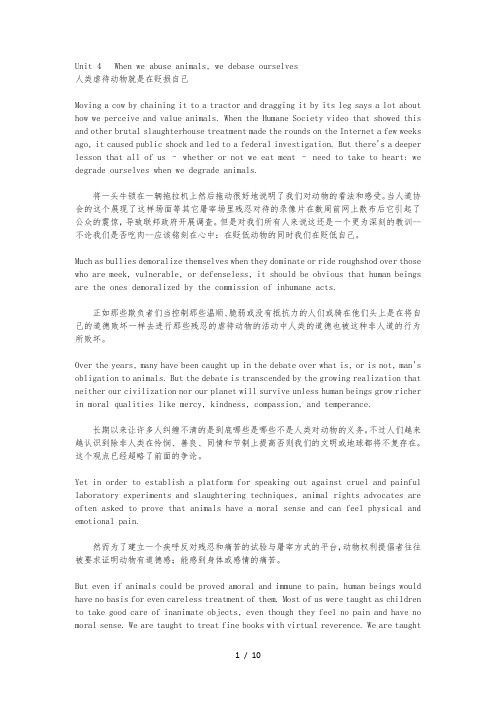
Unit 4 When we abuse animals, we debase ourselves人类虐待动物就是在贬损自己Moving a cow by chaining it to a tractor and dragging it by its leg says a lot about how we perceive and value animals. When the Humane Society video that showed this and other brutal slaughterhouse treatment made the rounds on the Internet a few weeks ago, it caused public shock and led to a federal investigation. But there's a deeper lesson that all of us – whether or not we eat meat – need to take to heart: we degrade ourselves when we degrade animals.将一头牛锁在一辆拖拉机上然后拖动很好地说明了我们对动物的看法和感受。
当人道协会的这个展现了这样场面等其它屠宰场里残忍对待的录像片在数周前网上散布后它引起了公众的震惊,导致联邦政府开展调查。
但是对我们所有人来说这还是一个更为深刻的教训--不论我们是否吃肉--应该铭刻在心中:在贬低动物的同时我们在贬低自己。
Much as bullies demoralize themselves when they dominate or ride roughshod over those who are meek, vulnerable, or defenseless, it should be obvious that human beings are the ones demoralized by the commission of inhumane acts.正如那些欺负者们当控制那些温顺、脆弱或没有抵抗力的人们或骑在他们头上是在将自己的道德败坏一样去进行那些残忍的虐待动物的活动中人类的道德也被这种非人道的行为所败坏。
Unit3Lying全新版大学英语综合教程五课文翻译
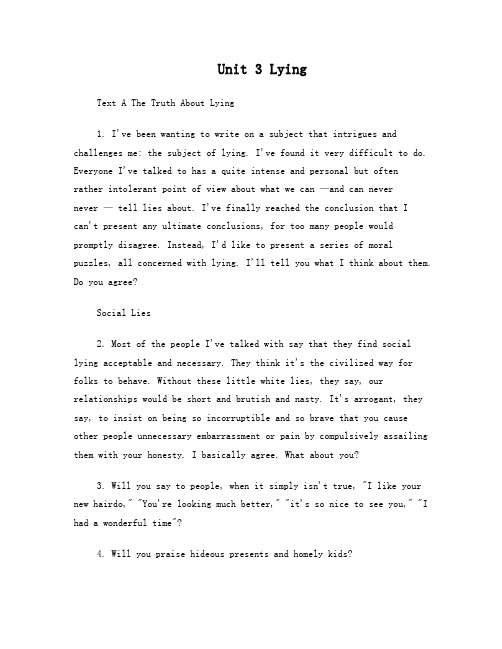
Unit 3 LyingText A The Truth About Lying1. I've been wanting to write on a subject that intrigues and challenges me: the subject of lying. I've found it very difficult to do. Everyone I've talked to has a quite intense and personal but oftenrather intolerant point of view about what we can —and can nevernever — tell lies about. I've finally reached the conclusion that Ican't present any ultimate conclusions, for too many people would promptly disagree. Instead, I'd like to present a series of moral puzzles, all concerned with lying. I'll tell you what I think about them. Do you agree?Social Lies2. Most of the people I've talked with say that they find social lying acceptable and necessary. They think it's the civilized way for folks to behave. Without these little white lies, they say, our relationships would be short and brutish and nasty. It's arrogant, they say, to insist on being so incorruptible and so brave that you cause other people unnecessary embarrassment or pain by compulsively assailing them with your honesty. I basically agree. What about you?3. Will you say to people, when it simply isn't true, "I like your new hairdo," "You're looking much better," "it's so nice to see you," "I had a wonderful time"?4. Will you praise hideous presents and homely kids?5. Will you decline invitations with "We're busy that night — so sorry we can't come," when the truth is you'd rather stay home than dine with the So-and-sos?6. And even though, as I do, you may prefer the polite evasion of "You really cooked up a storm "instead of "The soup" —which tastes like warmed-over coffee —"is wonderful," will you, if you must, proclaim it wonderful?7. There's one man I know who absolutely refuses to tell social lies. "I can't play that game," he says; "I'm simply not made that way." And his answer to the argument that saying nice things to someonedoesn't cost anything is, "Yes, it does — it destroys your credibility." Now, he won't, unsolicited, offer his views on thepainting you just bought, but you don't ask his frank opinion unless you want frank, and his silence at those moments when the rest of us liars are muttering, "Isn't it lovely?" is, for the most part, eloquent enough. My friend does not indulge in what he calls "flattery, false praise and mellifluous comments." When others tell fibs he will not go along. He says that social lying is lying, that little white lies are still lies. And he feels that telling lies is morally wrong. What about you?Peace-Keeping Lies8. Many people tell peace-keeping lies: lies designed to avoid irritation or argument, lies designed to shelter the liar from possible blame or pain; lies (or so it is rationalized) designed to keep trouble at bay without hurting anyone.9. I tell these lies at times, and yet I always feel they're wrong.I understand why we tell them, but still they feel wrong. And whenever I lie so that someone won't disapprove of me or think less of me or holler at me, I feel I'm a bit of a coward, I feel I'm dodging responsibility, I feel...guilty. What about you?10. Do you, when you're late for a date because you overslept, say that you're late because you got caught in a traffic jam?11. Do you, when you forget to call a friend, say that you called several times but the line was busy?12. Do you, when you didn't remember that it was your father's birthday, say that his present must be delayed in the mail?13. And when you're planning a weekend in New York City and you're not in the mood to visit your mother, who lives there, do you conceal —with a lie, if you must — the fact that you'll be in New York? Or do you have the courage — or is it the cruelty? — to say, "I'll be in New York, but sorry — I don't plan on seeing you"?14. (Dave and his wife Elaine have two quite different points of view on this very subject. He calls her a coward. She says she's being wise. He says she must assert her right to visit New York sometimes and not see her mother. To which she always patiently replies: "Why should we have useless fights? My mother's too old to change. We get along much better when I lie to her.")15. Finally, do you keep the peace by telling your husband lies on the subject of money? Do you reduce what you really paid for your shoes?And in general do you find yourself ready, willing and able to lie to him when you make absurd mistakes or lose or break things?16. "I used to have a romantic idea that part of intimacy was confessing every dumb thing that you did to your husband. But after a couple of years of that," says Laura, "haveI changed my mind!"17. And having changed her mind, she finds herself telling peacekeeping lies. And yes, I tell them too. What about you?Protective Lies18. Protective lies are lies folks tell —often quite seriouslies —because they're convinced that the truth would be too damaging. They lie because they feel there are certain human values that supersede the wrong of having lied. They lie, not for personalgain, but because they believe it's for the good of the personthey're lying to. They lie to those they love, to those who trust them most of all, on the grounds that breaking this trust is justified.19. They may lie to their children on money or marital matters.20. They may lie to the dying about the state of their health.21. They may lie to their closest friend because the truth about her talents or son or psyche would be — or so they insist — utterly devastating.22. I sometimes tell such lies, but I'm aware that it's quite presumptuous to claim I know what's best for others to know. That's called playing God . That's called manipulation and control. And wenever can be sure, once we start to juggle lies, just where they'll land, exactly where they'll roll.23. And furthermore, we may find ourselves lying in order to backup the lies that are backing up the lie we initially told.24. And furthermore —let's be honest —if conditions were reversed, we certainly wouldn't want anyone lying to us.25. Yet, having said all that, I still believe that there are times when protective lies must nonetheless be told. What about you?Trust-Keeping Lies26. Another group of lies are trust-keeping lies, lies that involve triangulation, with A (that's you) telling lies to B on behalf of C (whose trust you'd promised to keep). Most people concede that onceyou've agreed not to betray a friend's confidence, you can't betray it, even if you must lie. But I've talked with people who don't want you telling them anything that they might be called on to lie about.27. "I don't tell lies for myself," says Fran, "and I don't want to have to tell them for other people." Which means, she agrees, that ifher best friend is having an affair, she absolutely doesn't want to know about it.28. "Are you saying," her best friend asks, "that you'd betray me?"29. Fran is very pained but very adamant. "I wouldn't want to betray you, so…don't tell me anything about it."30. Fran's best friend is shocked. What about you?31. Do you believe you can have close friends if you're not prepared to receive their deepest secrets?32. Do you believe you must always lie for your friends?33. Do you believe, if your friend tells a secret that turns out to be quite immoral or illegal, that once you've promised to keep it, you must keep it?34. And what if your friend were your boss — if you were perhaps one of the President's men — would you betray or lie for him over, say, Watergate?35. As you can see, these issues get terribly sticky.36. It's my belief that once we've promised to keep a trust, we must tell lies to keep it. I also believe that we can't tell Watergate lies. And if these two statements strike you as quite contradictory,you're right —they're quite contradictory. But for now they're the best I can do. What about you?37. There are those who have no talent for lying.38. "Over the years, I tried to lie," a friend of mine explained, "but I always got found out and I always got punished. I guess I gavemyself away because I feel guilty about any kind of lying. It looks as if I'm stuck with telling the truth."39. For those of us, however, who are good at telling lies, for those of us who lie and don't get caught, the question of whether or not to lie can be a hard and serious moral problem. I liked the remark of a friend of mine who said, "I'm willing to lie. But just as a lastresort — the truth's always better."40. "Because," he explained, "though others may completely accept the lie I'm telling, I don't."41. I tend to feel that way too.42. What about you?关于说谎的真相朱迪斯·维奥斯特我一直想写一个令我深感兴趣的话题:关于说谎的问题。
全新版大学英语综合教程4课文原文及翻译
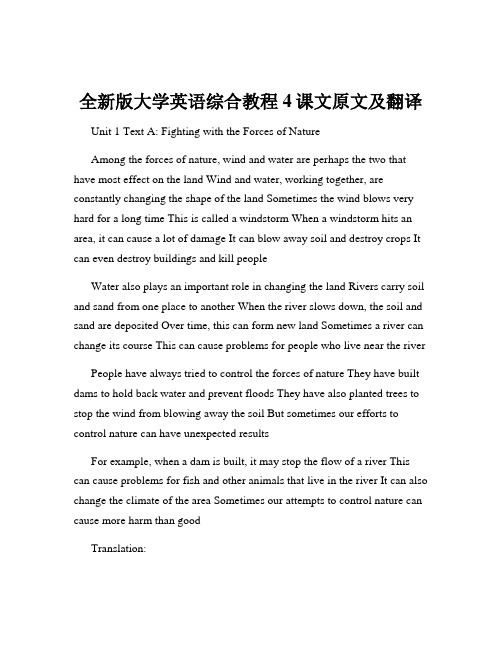
全新版大学英语综合教程4课文原文及翻译Unit 1 Text A: Fighting with the Forces of NatureAmong the forces of nature, wind and water are perhaps the two that have most effect on the land Wind and water, working together, are constantly changing the shape of the land Sometimes the wind blows very hard for a long time This is called a windstorm When a windstorm hits an area, it can cause a lot of damage It can blow away soil and destroy crops It can even destroy buildings and kill peopleWater also plays an important role in changing the land Rivers carry soil and sand from one place to another When the river slows down, the soil and sand are deposited Over time, this can form new land Sometimes a river can change its course This can cause problems for people who live near the riverPeople have always tried to control the forces of nature They have built dams to hold back water and prevent floods They have also planted trees to stop the wind from blowing away the soil But sometimes our efforts to control nature can have unexpected resultsFor example, when a dam is built, it may stop the flow of a river This can cause problems for fish and other animals that live in the river It can also change the climate of the area Sometimes our attempts to control nature can cause more harm than goodTranslation:在自然力量中,风和水也许是对陆地影响最大的两种力量。
新编大学英语综合教程课文翻译第一册

Unit 1 Personal Relationships1-1 The gift of life【1】炸弹落在了这个小村庄里。
在可怕的越南战争期间,谁也不知道这些炸弹要轰炸什么目标,而它们却落在了一所由传教士们办的小孤儿院内。
【2】传教士和一、两个孩子已经丧生,还有几个孩子受了伤,其中有一个小女孩,8岁左右,她的双腿被炸伤。
【3】几小时后,医疗救援小组到了。
救援小组由一名年轻的美国海军医生和一名同样年轻的海军护士组成。
他们很快发现有个小女孩伤势严重。
如果不立即采取行动,显然她将因失血过多和休克而死亡。
【4】他们明白必须给小女孩输血,但是他们的医药用品很有限,没有血浆,因此需要一种相配的血型。
快速的血型测定显示两名美国人的血型都不合适。
几个没有受伤的孤儿却有相配的血型。
【5】这位医生会讲一点越南语,护士会讲一点法语,但只有中学的法语水平。
孩子们不会说英语,只会说一点法语。
医生和护士用少得可怜的一点共同语言,结合大量的手势语,努力向这些受惊吓的孩子们解释说,除非他们能输一些血给自己的小伙伴,否则她将必死无疑。
接着问他们是否有人愿意献血来救小女孩。
【6】对医生和护士的请求,孩子们(只是)瞪大眼睛,一声不吭。
此时小病人生命垂危。
然而,只有这些受惊吓的孩子中有人自愿献血,他们才能够得到血。
过了好一会儿,一只小手慢慢地举了起来,然后垂了下去,一会儿又举了起来。
【7】"噢,谢谢。
" 护士用法语说。
"你叫什么名字?"【8】"兴," 回答道。
【9】兴很快被抱到一张床上,手臂用酒精消毒后,针就扎了进去。
在整个过程中,兴僵直地躺着,没有出声。
【10】过了一会儿,他发出了一声长长的抽泣,但立即用那只可以活动的手捂住了自己的脸。
【11】"兴,疼吗?" 医生问。
【12】兴默默地摇了摇头,但一会儿忍不住又抽泣起来,并又一次试图掩饰自己的哭声。
医生又问是否是插在手臂上的针弄疼了他,兴又摇了摇头。
全新版大学英语综合教程5(第二版)unit1-7课后翻译答案

II.Translation P25我的祖母不识字,可是她有一箩筐的神话和传奇故事。
小时候我总是缠着她,要她给我讲故事。
而她在忙完家务之后,总会把我抱到膝上,一边讲故事一边有节奏地晃动我。
我父母发现了我对故事的浓厚兴趣后,不失时机地引导我进行阅读。
他们给我买了许多带插图的故事书,有空的时候就一遍遍地读给我听。
慢慢我认识了很多字,能够自行阅读了。
Although my grandmother was illiterate,she had a good stock of myths and legends.When I was young I gave her no peace,constantly asking her to tell me stories.After she had finished her housework,she would lift me onto her lap and tell stories,all the while rocking me in rhythm.Having noticed my interest in stories,my parents lost no time in initiating me into reading. They bought many storybooks with illustrations,and whenever free,they would read these stories to me over and over again.By and by I had a vocabulary large enough to read on my own.UNIT2II.Translation P58一项又一项的研究发现,食物和一些慢性疾病之间有密切关系。
例如,某些慢性疾病危险的降低与多吃植物为基本成分的食物有关。
因此,在过去的十年中,美国饮食协会敦促美国人减少动物脂肪的摄取,增加水果、蔬菜和谷物的消费。
新编实用英语综合教程(第四版)上册Unit4-Unit6 课文段落翻译
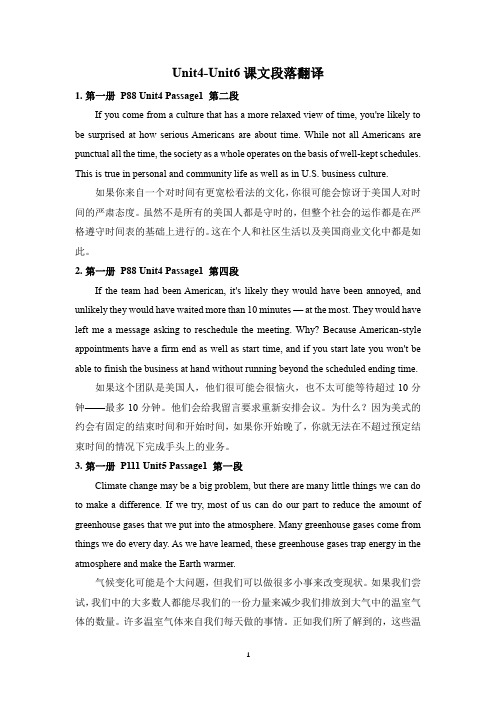
Unit4-Unit6课文段落翻译1.第一册P88 Unit4 Passage1 第二段If you come from a culture that has a more relaxed view of time, you're likely to be surprised at how serious Americans are about time. While not all Americans are punctual all the time, the society as a whole operates on the basis of well-kept schedules. This is true in personal and community life as well as in U.S. business culture.如果你来自一个对时间有更宽松看法的文化,你很可能会惊讶于美国人对时间的严肃态度。
虽然不是所有的美国人都是守时的,但整个社会的运作都是在严格遵守时间表的基础上进行的。
这在个人和社区生活以及美国商业文化中都是如此。
2.第一册P88 Unit4 Passage1 第四段If the team had been American, it's likely they would have been annoyed, and unlikely they would have waited more than 10 minutes — at the most. They would have left me a message asking to reschedule the meeting. Why? Because American-style appointments have a firm end as well as start time, and if you start late you won't be able to finish the business at hand without running beyond the scheduled ending time.如果这个团队是美国人,他们很可能会很恼火,也不太可能等待超过10分钟——最多10分钟。
新编英语教程第三版4翻译

Unit4 [见教材P61]Writing Between the Lines阅读时要做读书笔记Mortimer J. Adler(U.S.)莫迪摩尔.J.阿德勒(美国)①You know you have to read “between the lines” to get the most out of anything.②I want to persuade you to do something equally important in the course of your reading.③I want to persuade you to “write between the lines.”④Unless you do, you are not likely to do the most efficient kind of reading.①你很清楚,为了能够最充分地理解,你必须要能听读懂言外之意。
②现在,我想建议你在阅读时也要做同等重要的事,那就是建议你在阅读时做读书笔记,否则你的阅读不大可能是最有效的。
①I contend, quite bluntly, that marking up a book is not an act of mutilation but of love.①坦白说,我认为,人们阅读时在书上做笔记不是毁书,而是爱书。
① There are two ways in which you can own a book. ② The first is the property right[you establish by paying for it], just as you pay for clothes and furniture.③But this act of purchase is only the prelude to possession.④Full ownership comes only when you have made it a part of yourself, and the best way to make yourself a part of it is by writing in it. ⑤An illustration may make the point clear.⑥You buy a beefsteak and transfer it from the butcher,s icebox to your own. ⑦But you do not own the beefsteak in the most important senseuntil you consume it and get it into your bloodstream.⑧I am arguing that books, too, must be absorbed in your bloodstream to do you any good.①人们可以通过两种方式来拥有一本书。
Unit 4 Unforgettable Teachers全新版大学英语综合教程五课文翻译
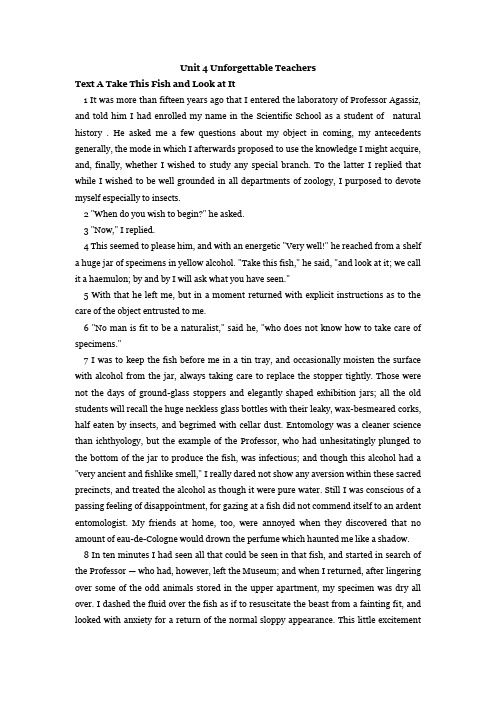
Unit 4 Unforgettable TeachersText A Take This Fish and Look at It1 It was more than fifteen years ago that I entered the laboratory of Professor Agassiz, and told him I had enrolled my name in the Scientific School as a student of natural history . He asked me a few questions about my object in coming, my antecedents generally, the mode in which I afterwards proposed to use the knowledge I might acquire, and, finally, whether I wished to study any special branch. To the latter I replied that while I wished to be well grounded in all departments of zoology, I purposed to devote myself especially to insects.2 "When do you wish to begin?" he asked.3 "Now," I replied.4 This seemed to please him, and with an energetic "Very well!" he reached from a shelfa huge jar of specimens in yellow alcohol. "Take this fish," he said, "and look at it; we call it a haemulon; by and by I will ask what you have seen."5 With that he left me, but in a moment returned with explicit instructions as to the care of the object entrusted to me.6 "No man is fit to be a naturalist," said he, "who does not know how to take care of specimens."7 I was to keep the fish before me in a tin tray, and occasionally moisten the surface with alcohol from the jar, always taking care to replace the stopper tightly. Those were not the days of ground-glass stoppers and elegantly shaped exhibition jars; all the old students will recall the huge neckless glass bottles with their leaky, wax-besmeared corks, half eaten by insects, and begrimed with cellar dust. Entomology was a cleaner science than ichthyology, but the example of the Professor, who had unhesitatingly plunged to the bottom of the jar to produce the fish, was infectious; and though this alcohol had a "very ancient and fishlike smell," I really dared not show any aversion within these sacred precincts, and treated the alcohol as though it were pure water. Still I was conscious of a passing feeling of disappointment, for gazing at a fish did not commend itself to an ardent entomologist. My friends at home, too, were annoyed when they discovered that no amount of eau-de-Cologne would drown the perfume which haunted me like a shadow.8 In ten minutes I had seen all that could be seen in that fish, and started in search of the Professor — who had, however, left the Museum; and when I returned, after lingering over some of the odd animals stored in the upper apartment, my specimen was dry all over. I dashed the fluid over the fish as if to resuscitate the beast from a fainting fit, and looked with anxiety for a return of the normal sloppy appearance. This little excitementover, nothing was to be done but to return to a steadfast gaze at my mute companion. Half an hour passed —an hour —another hour; the fish began to look loathsome. I turned it over and around; looked it in the face — ghastly; from behind, beneath, above, sideways, at three-quarters' view — just as ghastly. I was in despair; at an early hour I concluded that lunch was necessary; so, with infinite relief, the fish was carefully replaced in the jar, and for an hour I was free.9 On my return, I learned that Professor Agassiz had been at the Museum, but had gone, and would not return for several hours. My fellow-students were too busy to be disturbed by continued conversation. Slowly I drew forth that hideous fish, and with a feeling of desperation again looked at it. I might not use a magnifying-glass; instruments of all kinds were interdicted. My two hands, my two eyes, and the fish: it seemed a most limited field. I pushed my finger down its throat to feel how sharp the teeth were. I began to count the scales in the different rows, until I was convinced that was nonsense. At last a happy thought struck me — I would draw the fish; and with surprise I began to discover new features in the creature. Just then the Professor returned.10 "That is right," said he; "a pencil is one of the best of eyes. I am glad to notice, too, that you keep your specimen wet, and your bottle corked."11 With these encouraging words, he added: "Well, what is it like?"12 He listened attentively to my brief rehearsal of the structure of parts whose names were still unknown to me: the fringed gill-arches and movable operculum; the pores of the head, fleshy lips and lidless eyes; the lateral line, the spinous fins and forked tail; the compressed and arched body. When I finished, he waited as if expecting more, and then, with an air of disappointment:13 "You have not looked very carefully; why," he continued more earnestly, "you haven't even seen one of the most conspicuous features of the animal, which is plainly before your eyes as the fish itself; look again, look again!" and he left me to my misery.14 I was piqued; I was mortified. Still more of that wretched fish! But now I set myself to my task with a will, and discovered one new thing after another, until I saw how just the Professor's criticism had been. The afternoon passed quickly; and when, towards its close, the Professor inquired:15 "Do you see it yet?"16 "No," I replied, "I am certain I do not, but I see how little I saw before."17 "That is next best," said he, earnestly, "but I won't hear you now; put away your fish and go home; perhaps you will be ready with a better answer in the morning. I will examine you before you look at the fish."18 This was disconcerting. Not only must I think of my fish all night, studying, without the object before me, what this unknown but most visible feature might be; but also, without reviewing my discoveries, I must give an exact account of them the next day. I had a bad memory; so I walked home by Charles River in a distracted state, with my two perplexities.19 The cordial greeting from the Professor the next morning was reassuring; here was a man who seemed to be quite as anxious as I that I should see for myself what he saw.20 "Do you perhaps mean," I asked, "that the fish has symmetrical sides with paired organs?"21 His thoroughly pleased "Of course! Of course!" repaid the wakeful hours of the previous night. After he had discoursed most happily and enthusiastically — as he always did — upon the importance of this point, I ventured to ask what I should do next.22 "Oh, look at your fish!" he said, and left me again to my own devices. In a little more than an hour he returned, and heard my new catalogue.23 "That is good, that is good!" he repeated; "but that is not all; go on"; and so for three long days he placed that fish before my eyes, forbidding me to look at anything else, or to use any artificial aid. "Look, look, look," was his repeated injunction.24 This was the best entomological lesson I ever had — a lesson whose influence has extended to the details of every subsequent study; a legacy the Professor had left to me, as he has left it to so many others, of inestimable value which we could not buy, with which we cannot part.25 The fourth day, a second fish of the same group was placed beside the first, and I was bidden to point out the resemblances and differences between the two; another and another followed, until the entire family lay before me, and a whole legion of jars covered the table and surrounding shelves; the odor had become a pleasant perfume; and even now, the sight of an old, six-inch worm-eaten cork brings fragrant memories.26 The whole group of haemulons was thus brought in review; and, whether engaged upon the dissection of the internal organs, the preparation and examination of the bony framework, or the description of the various parts, Agassiz's training in the method of observing facts and their orderly arrangement was ever accompanied by the urgent exhortation not to be content with them.27 "Facts are stupid things," he would say, "until brought into connection with some general law."28 At the end of eight months, it was almost with reluctance that I left these friends and turned to insects; but what I had gained by this outside experience has been ofgreater value than years of later investigation in my favorite groups.把这条鱼拿去好好看看塞缪尔·斯卡德我是在15余年前进入阿加西兹教授的实验室的,告诉他我已在科学学院注册读博物学。
- 1、下载文档前请自行甄别文档内容的完整性,平台不提供额外的编辑、内容补充、找答案等附加服务。
- 2、"仅部分预览"的文档,不可在线预览部分如存在完整性等问题,可反馈申请退款(可完整预览的文档不适用该条件!)。
- 3、如文档侵犯您的权益,请联系客服反馈,我们会尽快为您处理(人工客服工作时间:9:00-18:30)。
Unit Four 看不到的贫穷/穷人
在美国,数以百万计的穷人日趋隐形。
虽然他们的群体是如此的庞大,但是要看到他们非得有足够的智慧和意志不可。
我是亲自通过一种奇特的方式发现这一点的。
在我完成第一篇有关美国贫困的文章后,所有的统计数字就都跃然纸上了。
令我感到满足的是,我总算证明出在这个国家有大约50,000,000穷人。
但是我意识到我并不相信自己得出的数字。
穷人存在于政府的报告中,仅仅是一系列长长的而且紧紧相连的栏目中的数字和百分比,并未溶入我的经历。
我能够证明另一个美国的存在,但却从未去过那里。
有些长期造成的原因使另一个美国成为一个看不到的国度。
贫穷常常产生在人迹罕至的地方。
而且总是如此。
普通游客从来不会离开主干道,而现在他往来于洲际高速公路。
他不去宾夕法尼亚的山谷,那里的市镇宛如电影里的三四十年代威尔士的场景。
他没有看到一排排的工厂住房和布满车辙的马路(无论是住在城市、乡镇或农场,穷人的路都不好走),所有的东西都黑乎乎脏兮兮的。
即使游客碰巧经过这些地方,他也不会见到酒吧里的失业男人和彻头彻尾的血汗工厂里收工回家的妇女。
其次,美景和神话是贫穷永久的面具。
旅游者在宜人的季节来到阿巴拉契亚山。
他看到了山川,溪流,树叶——但没有贫穷。
或者也许他看着一栋破败的山居,更多联想到的是卢梭而不是用他的眼睛进行仔细观察,于是他断定“那些人”真的很幸运,能够按照自己的方式生活,能够幸运地免除中产阶级的紧张和压力。
他们唯一的问题是“那些人”,那些山中奇特的居民,没有受过良好的教育,生活水平低下,缺乏医疗保障,正处在被迫离开土地涌入城市讨生活的过程,而在城市里他们无所适从。
这些都是造成贫穷隐形的正常而且显而易见的原因。
这些原因几十年前就起作用,此后几十年将继续起作用。
更为重要的是要知道随着美国社会的发展,一种新型式的对贫穷的忽视正在出现。
穷人正在逐渐从人们的经历和意识中淡出。
如果说中产阶级从来就不喜欢丑陋和贫穷,至少他们以前知道有这么回事儿。
“在贫民区”并不是很远的一段路。
圣诞节时他们会涉足贫民窟,也有慈善机构与穷人保持联系。
只要到商业区工作或娱乐,几乎每个人都时不时经过黑人聚居区或廉价公寓区。
现在美国的城市被改造了,穷人们依然居住在市中心极差的住宅群里,但是他们逐步与外界孤立,无法进入任何人的视线。
中产阶级妇女难得进城在剧院里消磨一个晚上,途中可能会瞥见另一个美国,但他们的孩子被隔离在郊外的学校里。
商人或职员们可能驾车或搭公车经过贫民窟的边缘,但这对他们来说并不算是一个很重要的经历。
那些一败涂地的,无一技之长的,伤残的,年老的以及少数民族(弱势群体)就在那里,他们一直以来就住的贫民窟里。
但是除此之外,那里没有任何其他人。
总而言之,美国城市的发展把贫穷状况从人们的生活当中消除,从成百上千美国中产阶级的情感体验中消除。
幽居在郊区,人们很容易想象,我们的社会确实是富足的。
更糟的是,这种对贫穷的新的隔离混合着一种善意的无知。
很多富有同情心的美国人都清楚有许多关于城市改建的讨论。
当他们驾车经过市区时,突然注意到一个熟悉的贫民窟被推倒,曾经是廉价公寓和简易房子的地方屹立起现代化的高楼大厦,一种温暖的满足感油然而生。
他们为问题的解决感到由衷欣慰:很显然,穷人受到很好的关照。
具有讽刺意味的是:事实跟这种印象恰恰截然相反。
美国战后各种各样的住房项目所造成的总的影响是把越来越多的人塞进现有的贫民窟中……。
着装也使穷人们趋于隐形。
美国的穷人是全世界穿得最好的穷人。
由于多种原因,大规模生产带来的好处在这一领域比其它领域分布得更平均。
在美国,一个人轻而易举就可以穿着体面,但说到体面的居住环境,良好的饮食和医疗条件就是不那么容易了。
即使收入来源十分窘迫的人也能穿的有模有样,看
上去有如事业有成的成功人士。
这是决定我们对于贫穷确实存在的无知的一个极其重要的因素。
在底特律,从公司设立储物柜的那天起,社会地位的存在变得越来越难以分辨。
从那以后,再也看不到人们穿着工作服到工厂上班,而是穿着家常裤和白衬衣的市民。
这一过程美化了全国上下的穷人。
在大城市中有成百上千的美国人尽管穿着鞋子,或者甚至是剪裁时髦的洋装,却在饿肚子。
这并非蓄意所为,虽然看起来差不多是这个富足的社会将服装分发给穷人使他们不至于破衣烂衫的碍别人的眼。
而且,很多穷人都处在一个“隐形”的年龄,他们很多人(超过8,000,000)年龄在六十五以上,更多的人未满十八岁。
另一个美国中的那些年老的人经常生病,不能动弹。
有人在孤独落寞中了此生,他们或终日枯坐在廉价租来的房子里,或紧挨在早已彻底改头换面的临近宅子边。
事实上,老年人贫困最差的方面是人们看不见也不会想到他们,他们很孤独。
年轻人相对要更受关注些,但他们的活动范围也同样局限于他们住所附近。
小报故事时不时出现耸人听闻的帮派血斗,他们以此将他们的贫穷广而告之。
但他们一般不会打扰中产阶级街区的安静。
最后,穷人在政治上也是隐形的。
发达国家社会生活中最残酷的讽刺之一就是处于社会底层的无依无靠的人们不能够为自己说话。
一般来说另一个美国的人们显然不属于工会,兄弟会或政党。
他们没有自己的游说团;他们从不提出议案。
作为一个团体他们是一盘散沙。
他们没有表情;他们没有声音。
因此,甚至没有一个如过去一样的一个虚伪的政治动机来关心穷人。
因为贫民窟不再是强大的政治组织中心,政客们无须实实在在的关心那里的居民。
中产阶级也看不到贫民窟,因此很多为需要帮助的人而战的理想主义的强烈欲望消失殆尽。
只有一些社会机构才真正与另一个美国有联系,但他们缺乏强大的政治力量。
如果说穷人有自己的发言人,那么那个角色是由劳工运动来扮演的。
这个组织有自己特定的理想体系。
而且,他们意识到廉价无组织的劳工群体的存在是对整个经济中工资和劳动条件威胁。
因此很多工会的立法提案——扩大最低工资和社会保障的覆盖面、组织农场季节工人——都明确地表明了穷人的需求。
穷人是隐形的,这对他们来说是一件很重要的事情。
他们不单单是在改革的花言巧语中被忽视,被忘却;更糟糕的是,人们根本看不到他们。
